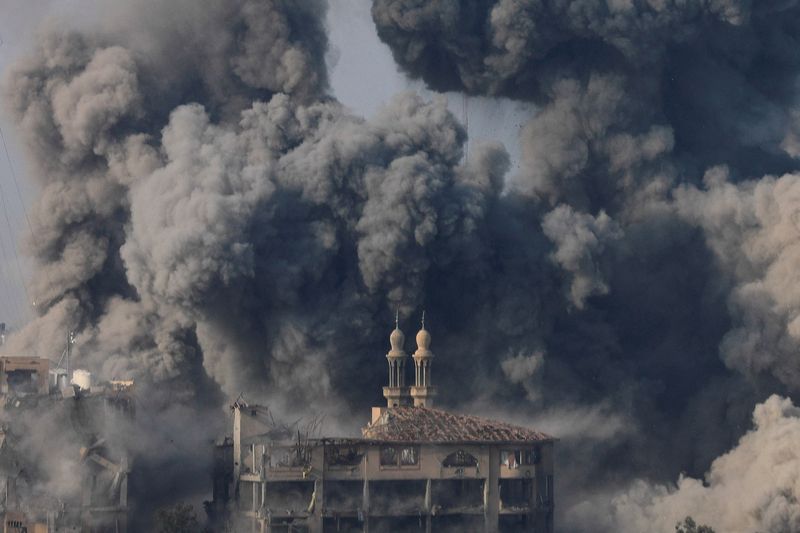By Stephanie van den Berg and Anthony Deutsch
THE HAGUE (Reuters) - War between Israel and Palestinian militants since the surprise cross-order attack by Gaza's ruling Islamist group Hamas has caused a large and rising civilian death toll - and accusations of war crimes - on both sides.
The conflict falls under a complex international system of justice that has emerged since World War Two. Even if states say they are acting in self-defence, international rules regarding armed conflict apply to all participants in a war.
WHAT LAWS GOVERN THE CONFLICT?
Internationally accepted rules of armed conflict emerged from the 1949 Geneva Conventions, which have been ratified by all United Nations member states and supplemented by rulings at international war crimes tribunals.
A series of treaties governs the treatment of civilians, soldiers and prisoners of war in a system collectively known as the "Law of Armed Conflict" or "International Humanitarian Law". It applies to government forces and organised, non-state armed groups, which would include Hamas militants.
WHAT ACTS COULD VIOLATE WAR CRIMES LAW?
New York-based Human Rights Watch cited as possible war crimes the deliberate targeting of civilians, indiscriminate rocket attacks, and the taking of civilians as hostages by Palestinian armed groups, as well as the Israeli counter-strikes in Gaza that have killed thousands of Palestinians.
The taking of hostages, murder and torture are explicitly banned under the Geneva Conventions, while Israel's response could also be subject to a war crimes investigation.
Hamas militants stormed from Gaza into nearby southwestern Israeli communities on Oct. 7 and killed about 1,400 people, most of them civilians, in one day. They also took about 240 hostages back to the small, Hamas-ruled enclave.
In response, Israel laid siege to Gaza, home to 2.3 million people, and launched the most powerful bombing campaign in the 75-year-old history of the Israeli-Palestinian conflict, destroying entire neighbourhoods. Israeli ground forces then swept into Gaza at the end of last week with the stated aim of annihilating Hamas, with air strikes continuing.
Following aerial bombings of Gaza's Jabalia refugee camp this week, in which Israel said it targeted and killed two senior Hamas commanders, the U.N. High Commissioner for Human Rights cited concern that Israel's srikes were "disproportionate attacks that could amount to war crimes".
WHAT DO THE GENEVA CONVENTIONS SAY?
Their overarching goal is to protect civilians in wartime.
Under the laws of armed conflict, combatants include members of state armed forces, military and volunteer forces and non-state armed groups.
Directly targeting civilians or civilian objects is strictly forbidden. Intentionally attacking personnel and material involved in humanitarian assistance is a separate war crime as long as those providing the humanitarian aid are civilians.
A siege can be considered a war crime if it targets civilians, rather than a legitimate means to undermine the military capabilities of a force like Hamas, or if found to be disproportionate.
International Criminal Court prosecutor Karim Khan has warned the Israeli army that it will need to show that "any attack that impacts innocent civilians or protected objects" such as hospitals, churches, schools or mosques must be done in accordance with laws of armed conflict.
Under these laws there are instances in which otherwise civilian objects can become legitimate military targets if they are being used to effectively contribute to military action.
"The burden of proving that the protective status is lost rests with those who fire the gun, the missile, or the rocket in question," Khan said.
Israel says Hamas fighters use residential neighbourhoods as cover and civilian buildings to conceal command posts and arms.
Even if a combatant attacks legitimate military targets, any assault has to be proportional, meaning it must not lead to excessive loss of civilian life or damage to civilian objects.
The Geneva Conventions and subsequent rulings by international tribunals show that proportionality is not a numbers game where the toll of civilian casualties on one side can be compared to the other, rather such casualties should be proportionate to the direct and concrete military advantage expected from that specific attack.
WHICH INSTITUTIONS CAN TRY ALLEGED WAR CRIMES?
The first in line to try alleged war crimes are local jurisdictions, in this case courts in Israel and the Palestinian territories.

If alleged Palestinian perpetrators of atrocities in Israel and all alleged perpetrators of crimes in the occupied Palestinian territories are not brought to justice at home, the International Criminal Court (ICC) in The Hague is the only international legal organ able to bring charges.
The ICC's founding Rome Statute gives it legal authority to investigate alleged crimes on the territory of its member states or by their nationals, when domestic authorities are "unwilling or unable" to do so.